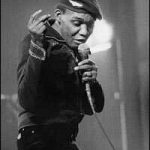Gussie Clarke
The Legendary Journey of Reggae Maestro: Gussie Clarke
Early Life and Formative Years
Augustus “Gussie” Clarke was born on March 26, 1954, in rural Jamaica. His birth name was Augustus Clarke. Tragically, he lost his mother at a young age, leaving him with no memories of her. He was later adopted by Miss Iris Robinson of Kingston, who played a pivotal role in shaping his early life. Gussie attended Calabar Primary School and the esteemed Kingston College, where he demonstrated an entrepreneurial spirit from a young age.
At Kingston College, Gussie developed a unique business by offering bicycle rides to fellow students, saving his earnings and lunch money to invest in music equipment. By acquiring a preamplifier, turntable, speakers, and power amplifier parts, he laid the foundation for his journey in the music industry. With assistance from Miss Robinson, he received a power amplifier as a birthday gift, further fueling his passion for music.
Birth of King Gussie Hi-Fi
Driven by an indomitable spirit, Gussie Clarke established King Gussie Hi-Fi, joining the ranks of legendary sound system operators in Jamaica. He imported records through a New York contact, supplying sound systems with international records and dub specials. This venture marked the beginning of his influence in the reggae scene, providing a platform for the burgeoning genre of DeeJay music, which would eventually inspire American rap.
The Dawn of a Production Career
In 1972, at just 18 years old, Gussie Clarke launched his record-producing career. His first artist was the iconic DeeJay U-Roy, who recorded the single “The Higher The Mountain.” This debut track became a classic, solidifying Clarke’s reputation as a visionary producer. His career was characterized by meticulous planning, focus, organization, and integrity, setting him apart in an industry thriving with creative talent but often lacking efficient administration.
Collaboration with Reggae Icons
Throughout the 1970s and early 1980s, Gussie Clarke worked with an impressive roster of artists, including Dennis Brown, Gregory Isaacs, Augustus Pablo, and The Mighty Diamonds. His knack for identifying talent led him to produce influential tracks like “Pass the Kouchie” in 1981. Clarke’s ability to pick winners ensured his continued success as he collaborated with artists such as Freddie McGregor, J.C. Lodge, Coco-T, Thriller-U, Shabba Ranks, and Maxi Priest.
Embracing the Digital Age
In the late 1980s, Gussie Clarke adapted to the emerging dancehall style of reggae. Unlike other producers, he sought to create polished recordings with the potential to cross over into international markets. His first foray into the digital sound was marked by The Mighty Diamonds’ album “The Real Enemy,” released in 1987. This album showcased a new digi-roots style, blending traditional roots reggae with digital dancehall rhythms.
Establishment of Music Works Studio
In 1988, Clarke founded Music Works Studio, embracing the digital reggae era. His studio became a hub for top-tier songwriters, musicians, and engineers. The first major releases from Music Works Studio were The Mighty Diamonds’ “Get Ready” and Gregory Isaacs’ “Red Rose For Gregory,” both of which showcased the studio’s innovative sound. Tracks like “Rumours” by Gregory Isaacs and “Telephone Love” by J.C. Lodge became defining hits of the era.
A Legacy of Innovation
Gussie Clarke is widely acknowledged as a pioneer in the Jamaican music industry. He was one of the first producers to issue regular royalty statements to artists and engaged in music publishing through Dub Plate Music Publishers. His commitment to quality and excellence set a high standard, recruiting the best engineers, musicians, and administrators to ensure his productions were top-notch.
The Anchor Recording Company
In 1993, Clarke took a bold step by relocating Music Works Studio to a more spacious property, renaming it Anchor Recording Company. This move expanded his recording facilities, making it a mecca for young artists and producers. The new complex boasted state-of-the-art studios that continued to attract talent from around the world.
Continued Influence and Recognition
Throughout the mid-1990s, Clarke continued to release music through his labels Anchor and Music Works, as well as other prominent labels like Greensleeves and VP Records. In 1999, he produced Dennis Brown’s “Stone Cold World,” marking a significant moment in his career. Although his production output slowed, Clarke remained active in the industry, producing compilation albums and collaborating with international artists like Rihanna.
In 2014, the Institute of Jamaica awarded Clarke a bronze Musgrave Medal for his contribution to music. By 2016, he rebranded his businesses under the Gussie Clarke Music Group, expanding into areas such as music publishing, media duplication, and online mixing and mastering.
A Lasting Legacy
Gussie Clarke’s influence on the reggae music industry is undeniable. His dedication to innovation, professionalism, and quality has made him a trendsetter in Jamaican music. He continues to oversee his companies, staying at the forefront of technological advancements and ensuring that his legacy endures. Gussie Clarke embodies integrity, perseverance, wisdom, and discipline, making him a revered figure in the world of reggae.











